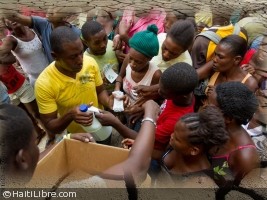|
||||||||||||||||||
|
|
Haiti - Health : Decrease 75% of cholera cases 02/05/2014 11:32:35
"Since the beginning of the dry season, we have seen registered the lowest number of cases and deaths since the start of the epidemic, with a reduction of 75% of cases in the first trimester of this year against the same period last year," stressed Peter de Clercq, the Deputy Special Representative for the Secretary-General in Haiti. "That is very good news and reflects our efforts so far are working," he said. "Of course, every case of cholera is one too many. Every person that dies of cholera is one too many and is unacceptable and will cause us to work even harder to combat the disease." Because the disease retracts to limited locations during the dry season, according to the UN Country Team, it presents a window of opportunity for the UN and its partners to target the highest risk areas with surveillance, analysis and rapid response for treatment and sanitation actions; work that continues throughout the year across wider sites of concern. An important endeavour has been differentiating cholera cases from acute diarrhoea, which has been widespread in Haiti for many years due to the lack of sanitation infrastructure. In fact, 80 per cent of suspected cases tested in February and March 2014 in sample areas turned out not to be cholera but acute diarrhoea. The analysis brings a sharper focus to health and sanitation efforts. Mr. de Clercq cautioned that great challenges remain in the effort to completely eliminate cholera in what he called Haiti's "fragile environment," wherein the little infrastructure that existed was further degraded by a series of events. "Every year, we have to deal with new challenges; fortunately last year we did not have major hurricanes, but we cannot be lucky every year," he said, stressing that only when a plan for country-wide sanitation, clean water and an integrated health system is funded and put in place would the danger be minimized. 30% of Haitians have no access to clean drinking water and only 26 per cent have access to improved latrines, he said. In addition, the UN Country Team estimates that 47 per cent of Haitians have no access to health services. However, Mr. de Clercq said, cholera can still be totally eliminated from the country, since the disease has not become endemic, or anchored in the environment. "It is still a transmission from person to person, or from temporary contamination of water points." Since the beginning of the epidemic in October 2010, the UN has initiated a system-wide effort to support the Government of Haiti to fight the disease. In December 2012, Secretary-General Ban Ki-moon launched an initiative for the elimination of cholera in Haiti and the Dominican Republic that focuses on prevention, treatment and education, as well as infrastructure planning for the long-term. Asked why the extensive measures so far have not stopped the disease, he commented, "I'm afraid there is no silver bullet for cholera. From the outside, it looks very doable, but in reality, when you're here on the ground with the type of resources we have and the international attention time-span, it isn't easy to address all the huge issues the country has to make progress on," most of which, he stressed, increase Haiti's vulnerability to cholera.
|
|
|
Why HaitiLibre ? |
Contact us |
Français
Copyright © 2010 - 2024 Haitilibre.com |



